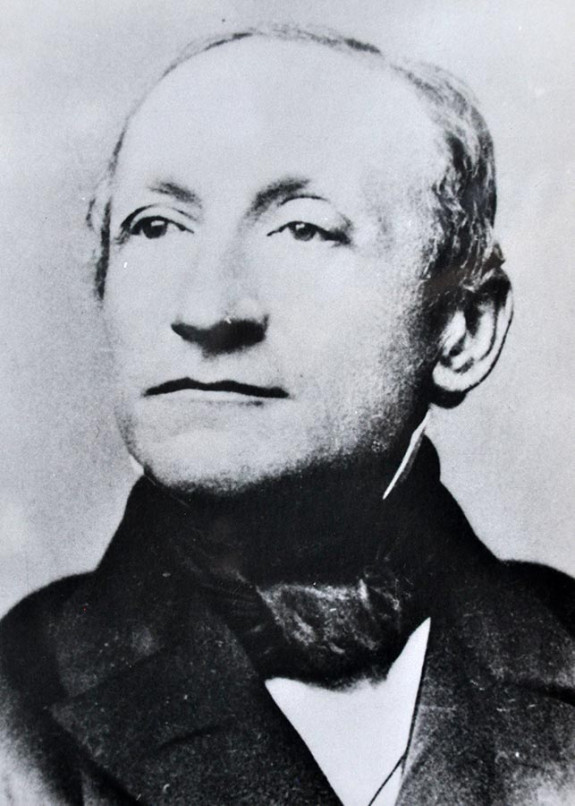First promoted, then defamed
Philipp Jaffé
- * 17.2.1819 in Schwersenz near Posen, today Swarzędz/Polen
- ✝ 3.4.1870 in Wittenberge
„Anyone who knows anything of the history of the Monumenta is aware that there is a certain kind of trauma associated with the name of the Jew Philipp Jaffé,“ observed Horst Fuhrmann in his 1996 monograph on the biographies of MGH scholars (Fuhrmann, p. 108). Jaffé was indeed one of the main protagonists in a bitter academic contention; in itself this was no rarity, but in his case the conflict was exacerbated by the spirit of anti-Semitism that prevailed in academic circles at that time and severely impeded his career. Writing his history of the MGH in 1921, Harry Bresslau took pains to present a balanced account of the events, but a more recent study with an edition of 229 letters published by Daniel R. Schwartz in 2016 clearly reveals how all parties involved contributed to the dramatic end of the conflict.
Philipp Jaffé grew up as the only son with four sisters in the orthodox Jewish family of Elias Jaffé, a merchant in the town of Schwersenz in the district of Posen (today Polish Swarzędz). Having lost his natural mother, who died at the birth of his first sister Ernestine, in 1821, Philipp referred to his stepmother, his father’s second wife and the mother of his three other sisters: Clara, Emmy and Fanny, as his mother. The family Jaffé had an important position in the Jewish community in Schwesenz. While Philipp Jaffé’s letters reveal that he was imbued with the Jewish way of life, he also came into contact with secular German educational values at school, since the Prussian authorities at that time enjoined their instruction also on Jewish schools.
At the age of 19, Jaffé began a mercantile education in Berlin in accordance with the wishes of his father, but two years later he was able to follow his own will and enrolled at the Berlin University as a full-time student to study history. In Berlin, Philipp Jaffé lived in a predominantly Jewish milieu, regularly visiting his Jewish relatives and friends. His publication of the regesta of papal charters in 1851 brought him scholarly renown at the age of 32, but with no immediate employment perspectives he began studying medicine in Berlin and Vienna in 1850 in order to become financially independent. In 1853, he received his degree as a medical doctor.
In 1854, Philipp Jaffé took up a position at the MGH allowing him to devote himself to his real passion, the study of historical sources. He worked with great élan for the MGH, contributing to a number of volumes published in the section Scriptores, until 1862, he when he abruptly resigned and cut his ties with the Monumenta, convinced that MGH president, Georg Heinrich Pertz, had obstructed him in obtaining a permanent position at the archives in Florence
In 1862, Philipp Jaffé received a extraordinary professorship for „Historische Hilfswissenschaften“ at the Berlin University, becoming the first Jewish humanities professor at a Prussian university. Jaffé was internationally recognised and esteemed for his skill and knowledge in palaeography und philology. As many other Jews at this time, he converted to Protestant Christianity in 1868, presumably for career reasons. Although in so doing he revoked his family traditions, he piously observed the traditional year of mourning for his father, who died in 1866, before taking this step. In that same year, 1868, the conflict with Pertz that had been smouldering since Jaffé’s departure from the MGH culminated with Pertz raising absurd accusations against him. Together with a number of other factors, this situation led to Jaffé’s suicide in 1870.
The conflict between Philipp Jaffé and Georg Heinrich Pertz not only left its traces in the history of the MGH as an institution, but also in a number of MGH publications. As the former Monumenta president Horst Fuhrmann pointed out, “Jaffé contributed importantly to six volumes published in the section Scriptores, but was not given credit for his work on the title page. For this reason, his name does not appear in the complete catalogue of MGH publications" (Fuhrmann, p. 109).
MGH editions
- Translatio et miracula S. Modoaldi, ex translatione S. Auctoris, miracula b. Egidii; Seheri primordia Calmosiacensia; Udalscalcus de Eginone et Herimanno; Vita Theogeri abbatis Georgii et episcopi Mettensis; Vita Godefridi comitis Capenbergensis; Rupertus de incendio Tiutiensi et de Cunone episcopo Ratisponensi, in: MGH SS 12 (Hannover 1856), pp. 284-347; pp. 429-447; pp. 449-500; S. 513-530; pp. 624-638
- Annales Argentinenses; Ellenhardi Argentinensis Annales et Chronica; Annales Maurimonasterienses; Annales Colmarienses, Basileenses, Chronicon Colmariense; Annales Benedictoburani; Notae Diessenses; Annales et notae Undersdorfenses; Annales et notae Scheftlarienses; Annales et historiae Altahenses; Annales SS. Udalrici et Afrae Augustenses; Notae Baumburgenses; Historiae et annales Windbergenses; Annales et notae Emmerammi Ratisbonenses et Weltenburgenses; Eberhardi Archidiaconi Ratisponensis Annales; Chounradi Schirensis Chronicon, Catalogi, Annales; Annales et notae Babenbergenses; Annales Bremenses, in: MGH SS 17 (Hannover 1861), pp. 86-141; pp. 181-270; pp. 319-320; pp. 323-327; pp. 332-438; pp. 559-576; pp. 591-605; pp. 613-642; pp. 854-858
- Annales Mediolanenses minores; Annales Laudenses auctoribus Ottone et Acerbo Morensis; Annales et notae Parmenses et Ferrarienses; Annales Cremonenses; Annales Bergomates, in: MGH SS 18 (Hannover 1863), pp. 383-402; pp. 582-810; pp. 660-799; pp. 800-807; pp. 809-810
- Rolandini Patavini Chronica; Annales Sanctae Iustinae Patavini, in: MGH SS 19 (Hannover 1866), pp. 32-193
Other selected publications
- Philipp Jaffé, Geschichte des deutschen Reiches unter Lothar dem Sachsen: Eine von der philosophischen Fakultät zu Berlin gekrönte Preisschrift, Berlin 1843
- Philipp Jaffé, Geschichte des Deutschen Reiches unter Conrad dem Dritten, Hannover 1845
- Regesta pontificum Romanorum ab condita ecclesia ad annum post Christum natum MCXVIII, ed. Philipp Jaffé, Berlin 1851; Editionem secundam correctam et auctam auspiciis Gulielmi Wattenbach curaverunt S. Loewenfeld, F. Kaltenbrunner, P. Ewald, Band I–II, Leipzig 1885–88
- Jaffé, Philipp, De arte medicina saeculi XII, Berlin 1853 - Dissertation
- Jaffé, Philipp, Monumenta Corbeiensia; Monumenta Gregoriana; Monumenta Moguntina; Monumenta Carolina; Monumenta Bambergensia; Monumenta Alcuniana (= Bibliotheca rerum Germanicarum, Bände 1-6; Band 6 postum hg. von Wilhelm Wattenbach und Ernst Dümmler), Berlin 1864-1873
Reference literature on Philipp Jaffé



